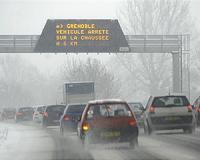 |
New Delhi (UPI) Feb 16, 2009 New Delhi's compressed natural gas program for auto-rickshaws is failing to make an impact on the city's pollution problem. Some industry leaders, led by Tata Group Chairman Ratan Tata, see hydrogen-fueled cars as part of the solution. They envision 1 million of the green vehicles on India's roads by 2020, the Financial Times reports. It is not necessarily by choice that owners of the three-wheeled rickshaws have complied with India's 1998 Supreme Court decision mandating that the vehicles be converted to run on compressed natural gas. The government's initiative followed a U.N. ranking of New Delhi as one of the five most polluted cities in the world. "Petrol is better," an operator of an auto-rickshaw taxi service told the Financial Times, complaining of the high expense to repair converted engines and the frequency of breakdowns. Delhi has 5 million vehicles and 1,100 more are added to its traffic-choked roads each day. Diesel is the preferred fuel. The Society for Indian Automobile Manufacturers said, diesel vehicles are expected to account for half of the country's car sales this year. During the past 18 months, the market share for diesel cars increased 10 percent. "Everybody says hydrogen is the fuel of the future, so we are working toward that," said Deepak Gupta, secretary for the Ministry of New and Renewable Energy. The ministry has encouraged public-private partnerships in the area but hasn't outlined specific objectives. But a hydrogen car will have to compete with inexpensive cars such as the Tata Nano, with a sticker price starting at $2,150. Scientists involved in research and development admit that it may take years to lower manufacturing costs for hydrogen vehicles. "At this stage it is very difficult to say (how long) but we need to have some breakthrough two or three years down the line," says B.M.S. Bist, hydrogen energy specialist at the energy ministry. As part of a $1 million pilot project, the U.N. Industrial Development Organization is developing a fleet of 15 pure hydrogen-fueled rickshaws. "Delhi is a place where pilot projects like this one have been successful in sending strong signals to the rest of the country," a researcher told the Financial Times. But Anumita Roychowdhury, an environmentalist, says more government support is needed for hydrogen vehicles to be viable, saying, "The government needs to design fiscal policy to cushion that cost, to enable commercialization -- and rapid commercialization. Only if you have scale can this program have impact."
Share This Article With Planet Earth
Related Links Car Technology at SpaceMart.com
 Swiss try bittersweet alternative to winter road salt
Swiss try bittersweet alternative to winter road saltGeneva (AFP) Feb 12, 2010 Switzerland is testing a bittersweet solution to clear snowbound and icy roads that replaces salt with a more environmentally friendly liquid laced with sugar. Many European countries - include Switzerland - are grappling with salt shortages in the unusually harsh winter and Swiss officials said they wanted to try out the more costly British-supplied "safecote" solution. "Apparently it ... read more |
|
| The content herein, unless otherwise known to be public domain, are Copyright 1995-2010 - SpaceDaily. AFP and UPI Wire Stories are copyright Agence France-Presse and United Press International. ESA Portal Reports are copyright European Space Agency. All NASA sourced material is public domain. Additional copyrights may apply in whole or part to other bona fide parties. Advertising does not imply endorsement,agreement or approval of any opinions, statements or information provided by SpaceDaily on any Web page published or hosted by SpaceDaily. Privacy Statement |